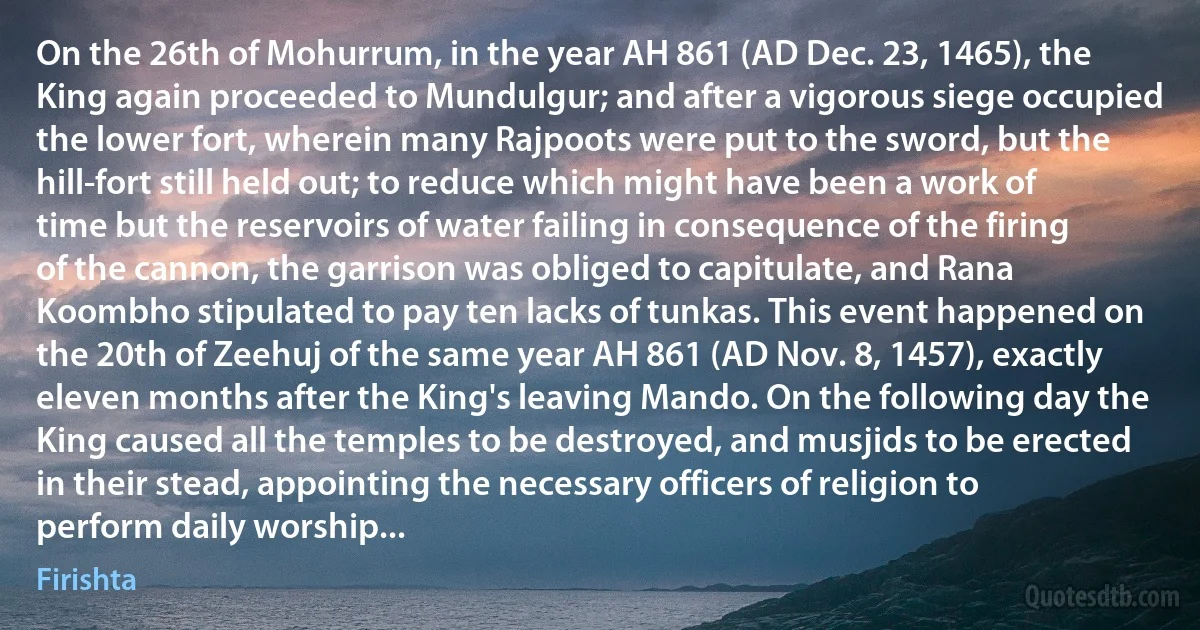
On the 26th of Mohurrum, in the year AH 861 (AD Dec. 23, 1465), the King again proceeded to Mundulgur; and after a vigorous siege occupied the lower fort, wherein many Rajpoots were put to the sword, but the hill-fort still held out; to reduce which might have been a work of time but the reservoirs of water failing in consequence of the firing of the cannon, the garrison was obliged to capitulate, and Rana Koombho stipulated to pay ten lacks of tunkas. This event happened on the 20th of Zeehuj of the same year AH 861 (AD Nov. 8, 1457), exactly eleven months after the King's leaving Mando. On the following day the King caused all the temples to be destroyed, and musjids to be erected in their stead, appointing the necessary officers of religion to perform daily worship...
FirishtaRelated topics
capitulate daily day eleven following garrison hold king leaving lower might necessary pay religion siege stead sword ten time water work worship year dec monthsRelated quotes
Perhaps the greatest change that industrialism (along with Protestantism and rationalism) has made in daily life is to separate work from leisure in a radical and almost absolute way. Once the efficacy of work began to be more clearly and fully appreciated, work had to become more efficacious in itself - that is, more efficient. To this end, it had to be more sharply separated from everything that was not work; it had to be made more concentratedly and purely itself - in attitude, in method and, above all, in time. Moreover, under the rule of efficiency, seriously purposeful activity in general tended to become assimilated to work. The effect of all this has been to reduce leisure to an occasion more exclusively of passivity, to a breathing spell and interlude; it has become something peripheral.

Clement Greenberg
"Three days after this, the king entered Jhain at midday and occupied the private apartment of the rai... He then visited the temples, which were ornamented with elaborate work in gold and silver. Next day he went again to the temples, and ordered their destruction, as well as of the fort, and set fire to the palace, and ‘thus made hell of paradise'... While the soldiers sought every opportunity of plundering, the Shah was engaged in burning the temples, and destroying the idols. There were two bronze idols of Brahma each of which weighed more than a thousand mans. These were broken into pieces and the fragments distributed amongst the officers, with orders to throw them down at the gates of the Masjid on their return.”65.

Amir Khusrow
Mahomed Ghoory, in the mean time returning from Ghizny, marched towards Kunowj, and engaged Jye-chund Ray, the Prince of Kunowj and Benares' This prince led his forces into the field, between Chundwar and Etawa, where he sustained a signal defeat from the vanguard of the Ghiznevide army, led by Kootbood-Deen Eibuk, and lost the whole of his baggage and elephants' He marched from thence to Benares, where, having broken the idols in above 1000 temples, he purified and consecrated the latter to the worship of the true God...'Mahomed Ghoory, following with the body of the army into the city of Benares, took possession of the country as far as the boundaries of Bengal, without opposition, and having destroyed all the idols, loaded four thousand camels with spoils.

Muhammad of Ghor
Ahmud Shah, without waiting to besiege the Hindoo capital, overran the open country; and wherever he went put to death men, women, and children, without mercy, contrary to the compact made between his uncle and predecessor, Mahomed Shah, and the Rays of Beejanuggur. Whenever the number of slain amounted to twenty thousand, he halted three days, and made a festival celebration of the bloody event. He broke down, also, the idolatrous temples, and destroyed the colleges of the bramins. During these operations, a body of five thousand Hindoos, urged by desperation at the destruction of their religious buildings, and at the insults offered to their deities, united in taking an oath to sacrifice their lives in an attempt to kill the King, as the author of all their sufferings...

Firishta
Janaki was one of the daughters of King Dahir of Sindh. She was captured along with her sister and sent to the Khalifa at Baghdad. When the Khalifa invited Janaki to share his bed, she lied to him that she had already been violated by Muhammad bin Qasim. Her sister supported her statement. The Khalifa ordered that Muhammad be sewed up in raw hide and sent to his court. Muhammad was already dead when the chest containing him arrived in Baghdad. Janaki accused the Khalifa of having killed one of his great generals without making proper enquiry. She said, 'The king has committed a very grievous mistake, for he ought not, on account of two slave girls, to have destroyed a person who had taken captive a hundred thousand modest women like us,... and who instead of temples had erected mosques, pulpits and minarets.

Muhammad bin Qasim
